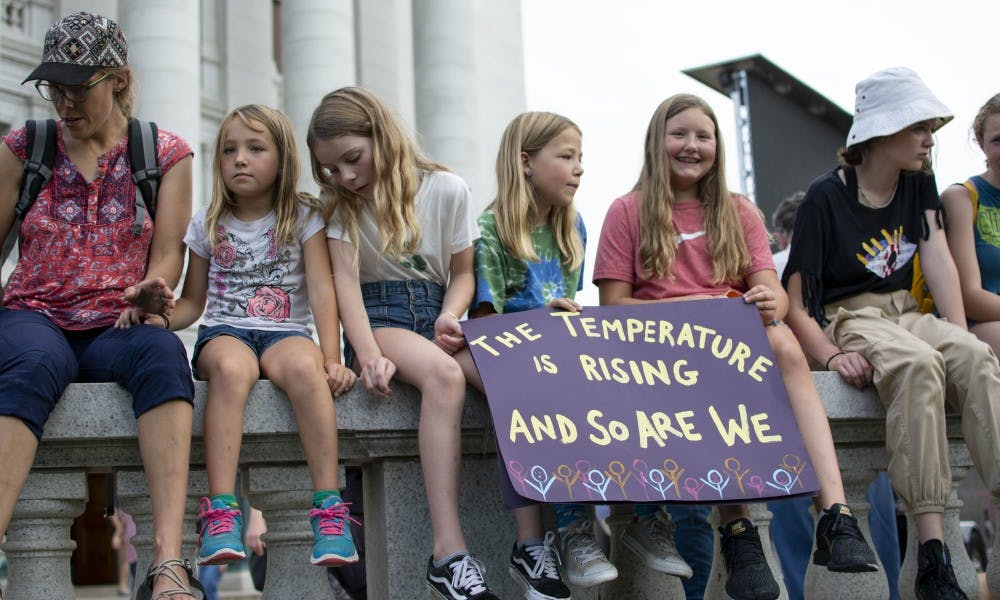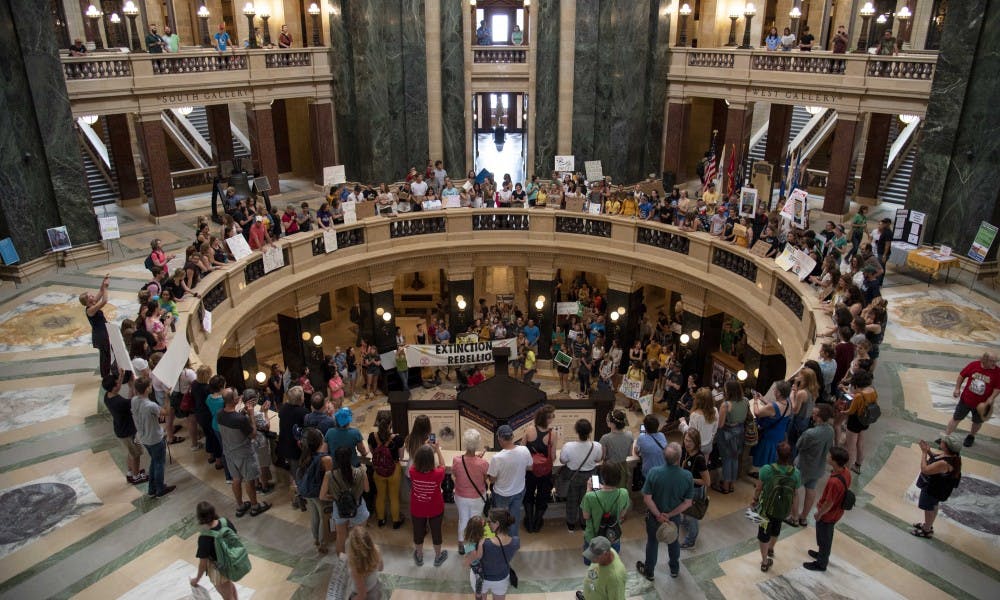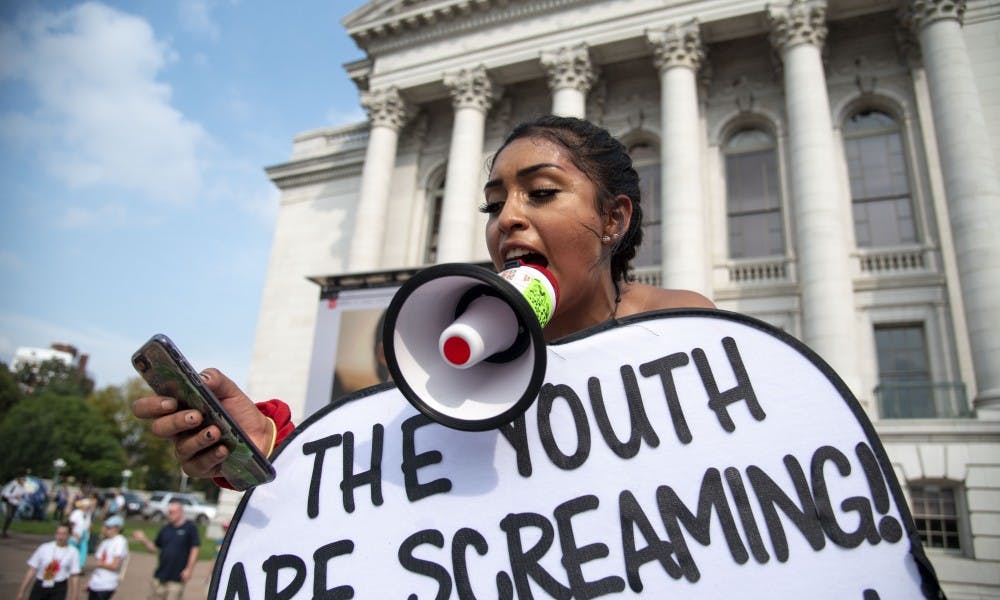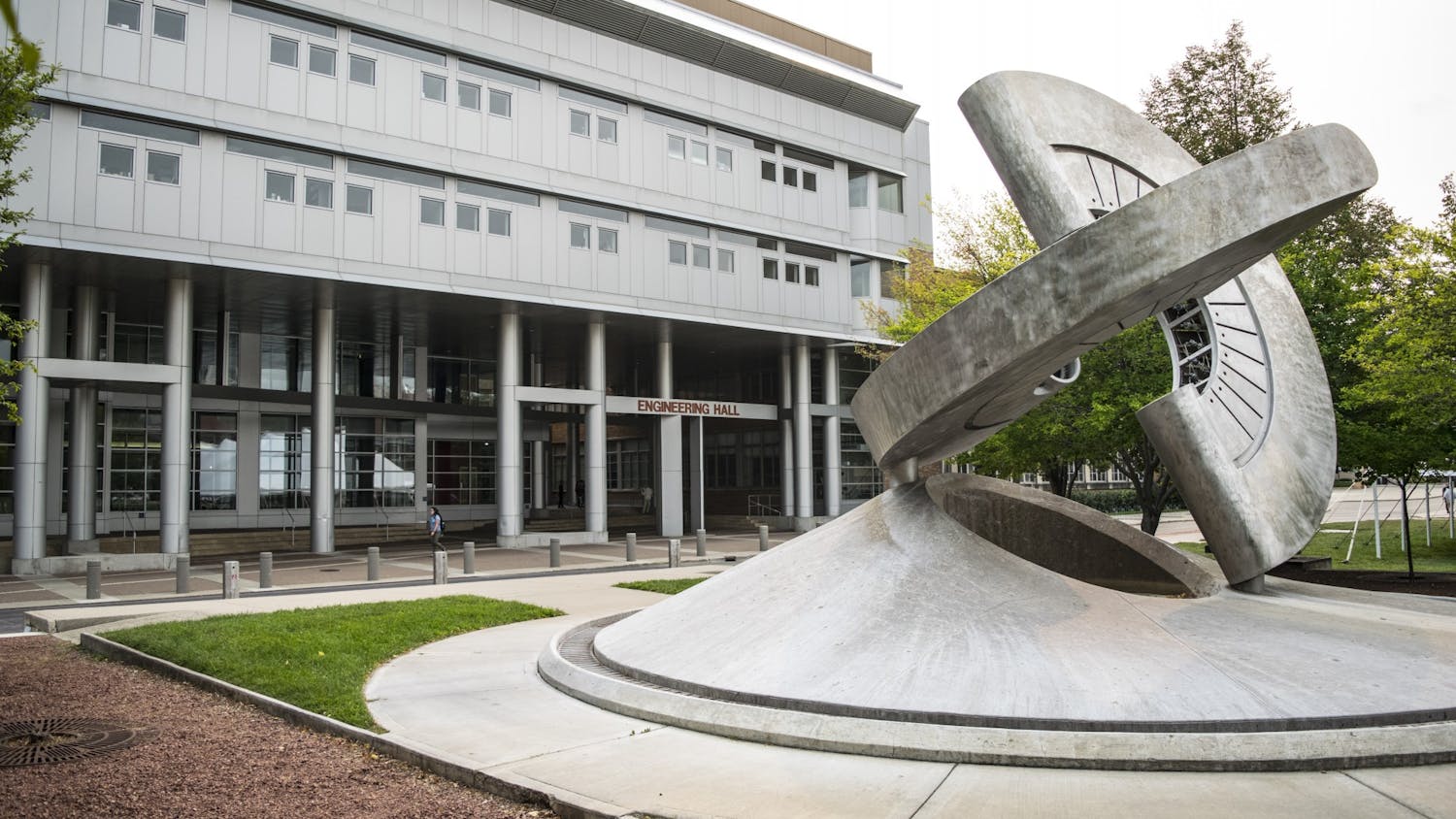City organizations, officials determine next steps following climate strike
Thousands of people showed up to Madison’s climate strike last Friday to support various local organizations that hosted the protest.
Though, one question lingers on many local activists' minds: What next?
Protest leaders demanded local county and city governments declare climate emergencies and put in place comprehensive policies to combat the climate crisis.
One organization involved in the strike, NextGen Wisconsin, took the energy from students and the public and redirected it toward the polls. They spoke to hundreds of students, said State Director Hannah Marcus — and even got 120 people registered to vote.
“Madison itself has seen climate change-related events in the past couple of years,” Marcus said, referencing the city’s severe flooding last year and environmental consequences of Madison Gas and Electric’s power plant fire. “It’s a safety concern for the community of Madison and the community of the world.”
Marcus said the Madison chapter of NextGen has yet to work with city officials, but they do “support organizations that put pressure on local government to set standards.”
Jared Schumacher, Chair of the Madison chapter of the Climate Reality Project, noted several obstacles in planning and implementing the strike: lack of communication between organizations, difficulty finding funding from local businesses and — mainly — how to make the momentum from the strike last.
Schumacher discussed it with the Youth Climate Action Team, a youth-run organization who took the lead in planning the Madison climate strike.
“There’s no one good answer and there’s no one overarching answer,” Schumacher said. “I think that’s what we need. This shouldn’t be the last strike because this isn’t something that’s going to be solved in six months and this isn’t something that’s going to be solved by the U.N. climate summit going on now.”
Schumacher noted some difficult financial aspects to the strike, mainly that organizations want to get as many donations as possible due to already tight budgets, he also said many were willing to chip in.
For example, Salvatore’s Tomato Pies provided one hundred 16-inch pies with a $500 discount.
Marcus stated that YCAT has a very clear next step. “They want Governor Tony Evers to declare a climate emergency for the state of Wisconsin and we are going to support them in their efforts to push back.”

Ald. Syed Abbas, District 12, serves on the Sustainable Madison Committee and thought the protest was “phenomenal.”
“It’s an environmental emergency,” Abbas said. “The strike was a great message for those policymakers and for other stakeholders to see [how] people are suffering and how this humanity can help policy. We all need to work together to achieve this goal.”
The Sustainable Committee has worked over the past 10 years in several areas to reduce Madison’s carbon emissions. Abbas mentioned specifically the committee’s work on building code environmental impact, a plastic straw ordinance that would raise awareness of the product’s harm and targeting other single-use plastics.
The committee is also working on an ordinance that would provide more electric vehicle charging stations in city infrastructure to — hopefully and eventually — reach zero tailpipe emissions.
“The committee is absolutely committed to addressing the climate goal: Zero carbon footprint for the city of Madison by 2030 and reaching that same goal for Dane County as a whole in 2050,” Abbas added.
Zero carbon footprint, according to the Committee on Climate Change, means reaching net-zero greenhouse gas emissions or simply eliminating carbon emissions altogether. Madison set this goal in its 2012 Sustainability Plan.
Abbas stated that Mayor Satya Rhodes-Conway is working with both Renew Wisconsin — a nonprofit organization that promotes renewable energy — and Clean Cities Wisconsin — a nonprofit that works to reduce petroleum consumption in the transportation sector.
Rhodes-Conway's Executive Capital Budget seeks to increase the City’s energy generated from renewable sources by 33 percent in 2020. It will accomplish this through solar installations on City buildings, funding a pilot solar job training program and purchasing renewable energy credits.
Schumaker said this is not enough.
“We need to set an obtainable goal and [set] some legislation with a time frame,” he stated. “Not 2050 because that’s just too far away.”
Additionally, Schumaker said that city officials need to support environmental organizations. More importantly, they need to talk about climate change to citizens and vice-versa.
“One of the most important roles is speaking to legislators from the city level, county level, state level,” Schumaker said. “They all need to be talked to — and yelled at sometimes. Laws are going to be the way we change this because people don’t change on their own.”
Abbas said that the Sustainability Committee is “absolutely” working with enough urgency, engaging with other city committees to create more sustainable practices and opening dialogues with local organizations.
But he also stated that change comes through policies and the city encounters many state restrictions.
“While working on ordinances, I realized you cannot put a ban on styrofoam or plastic,” Abbas said. “The state put a ban on cities to ban them so you have to find a creative way around it.”
As a result, Abbas is attempting to create a partnership with other executive state offices and making changes in places he can. Still, he said, the state-level restrictions require more aggressive action.
While some states — like in Illinois — can adapt state policy, Madison does not have that flexibility.
“I hope in the future we have the power to create our own policies,” Abbas said. “Then we can be much more effective in reaching our climate goals.”
— Allison Garfield, City News Editor
People’s Climate Emergency Office in Capitol generates energy for community sustainability discourse
Despite Wisconsin having a significantly more environmentally conscious governor in Tony Evers than his predecessor, organizers at the Global Climate Strike in Madison called for more dramatic action from the executive office during Friday’s march.
Throughout his campaign and during his first few addresses, Evers committed to pursuing 100 percent renewable energy use across Wisconsin by 2050. At the time, this was widely applauded by conservation voters and environmental organizations who acknowledged the efforts for a more sustainable future.
However, new goals and higher sustainability standards were set during the strike as marchers pushed Evers to plan for these changes to be made by 2030, and demanded he call for a state of climate emergency.
“It’s very possible that we could see mass extinction leading to our own extinction, and I am fearful what kind of world we are leaving to today’s generation all because we are so bent on continuing to live as we've been living,” said Timothy Cordon, environmental activist and current social justice coordinator at First Unitarian Society of Madison. “I think shooting for 2030 is super ambitious but it is more in line with making this more doable for your generation and the generations to come.”
Cordon has spent the last few months working to find a welcoming space for sustainability conversations to take place in order to see these demands become a reality.
With the help of Rep. Chris Taylor, D-Madison, Cordon and fellow mobilizers found a place to further engage with community members at the state Capitol this week following the strike.

Alongside the Youth Climate Action Team and other non-profit organizations like the Sierra Club, the People’s Climate Emergency Office is open to the public, 9 a.m. to 6 p.m. from Sept. 23 to Sept. 27 in room 300NE.
“I believe we should all be focused on how we can empower young people to make change, so I hope they use this space to organize and strategize on how to remedy the climate crisis we are facing,” Taylor said. “Our youth know a crisis when they see one. They are fighting for their future and we desperately need to follow their lead.”
Cordon said that having access to the office is just the beginning of sharing ideas and information to help the community move forward in their efforts to stop feedback loops causing what he calls “our current state of planetary hospice.”
“I think that we just need to wake each other up, and that is the process we are in right now,” Cordon said. “The action that comes out of it is going to have to be dramatic legislation that transitions us from a car culture to a mass transit culture … solar power, wind power and putting our resources that direction as though our lives depend on it.”
— Jessica Lipaz, State News Editor
UW System students join in Global Climate Strike
While members of the Madison community participated in Friday’s Global Climate Strike at the Capitol, students across the UW System also played a role in the historic protest.
Climate strikes took place in 14 cities and towns across Wisconsin on Sept. 20.
At UW-Eau Claire, the protest began on campus, and some professors even canceled class for the event, Director of the Student Office of Sustainability Lauren Becker said.
“We are long past a question of whether or not the climate crisis is occurring. It is now the question of what we’re going to do about it,” Becker said in a speech given at the protest. “And there are many of us doing tremendous work. But there needs to be more. And it cannot rest on the backs of our young people.”
The university’s Student Office of Sustainability partnered with Cove Collective, an Eau Claire arts and social justice organization, to host the strike through the Youth Climate Action Team. UW-Eau Claire Housing Sustainability intern Katrina Kawak and university facilities provided protesters with upcycled cardboard to make signs on, Becker said.
The strike began with recognition that the land they stood on was the traditional homeland of the Ojibwe and Dakota Nations.
Becker also used her speech to acknowledge “what we are doing today, striking and engaging in activism to demand change and sustainable action across the board, would not be possible without the teachings and models first demonstrated by Indigenous folks around our shared globe.”

Eau Claire protesters ranged from “high school students, religious leaders, community members, faculty, staff and many college students,” and numbers reached over 100, according to Becker.
They marched to City Hall, where speakers from the City Council, Citizens’ Climate Lobby Eau Claire Chapter and Joining Our Neighbors, Advancing Hope shared messages.
Students were also integral to the local climate strike at UW-Stevens Point, according to event organizer and sophomore Molly McGuire.
After contacting community and student environmental organizations for promotion or sponsorship, McGuire said the next step was publicizing the event on social media and with campus flyers.
McGuire and other organizers planned the protest for 4 p.m. so professors wouldn’t have to cancel class and working community members could attend. Around 200 people showed up to march through town, which McGuire noted was a larger turnout than the climate march held back in April.
Stevens Point Mayor Mike Wiza also attended and spoke at the event.
“You [all] being here today are going to be the catalyst to go out and tell those people that aren’t here today what we can do,” Wiza said.
At UW-La Crosse, students participated in the Global Climate Strike by spending 11 minutes reading their fears about climate change — the minutes representing the 11-year time limit to take action on climate change — WIZM reported.
Other UW System students and professors participated in climate strikes around local communities, such as Appleton, Green Bay and Milwaukee.
“I don’t know about all of you, but I know that the university and our nation as a whole appreciates and desires the work that I do and the learning I participate in,” Becker said in her speech. “By striking we communicate that we will not be complacent.”
— Dana Brandt, College News Editor
Madison Climate Strike emphasizes climate justice for UW-Madison
Many students throughout UW-Madison joined the Madison climate strike at the Capitol Friday afternoon advocating for climate justice in Wisconsin and around the world.
The main goal of the climate strike was to urge Gov. Tony Evers to declare a climate emergency for Wisconsin, push for Madison Gas and Electric to become 100 percent renewable by 2030 and educate the community on climate justice.
“We don’t really have a choice but to fight for our future, we’ve been forced to do this,” said Sophie Guthier, executive director of the Youth Climate Action Team and UW-Madison freshman.
According to Guthier, MG&E made a lot of false promises about their efforts to reduce non-renewable energy sources — the strike focused on their role in local climate change.
“The purpose of the strike was amplifying that combating climate change and supporting climate justice is important,” UW freshman Eva Haubrich said.
Haubrich elaborated on how the individual push to stop single-use plastic or reduce animal agriculture is a form of climate injustice since it is not economically feasible for many communities.

YCAT takes climate injustices facing people of color as integral to their advocacy.
“Climate change affects indigenous people and marginalized groups more than it affects privileged white people, and a lot of times it isn't emphasized or even talked about,” said Haubrich.
A plethora of youth activists spoke at the strike, emphasizing climate justice and educating the masses on the political and economic side of climate activism.
“I think it [the strike] was successful, but I wouldn’t say that we accomplished everything that we wanted to,” Guthier said. “I still haven’t heard from Tony Evers about declaring a climate emergency and we still are having push back from MG&E.”
— Morgan Lock, Senior Staff Writer






